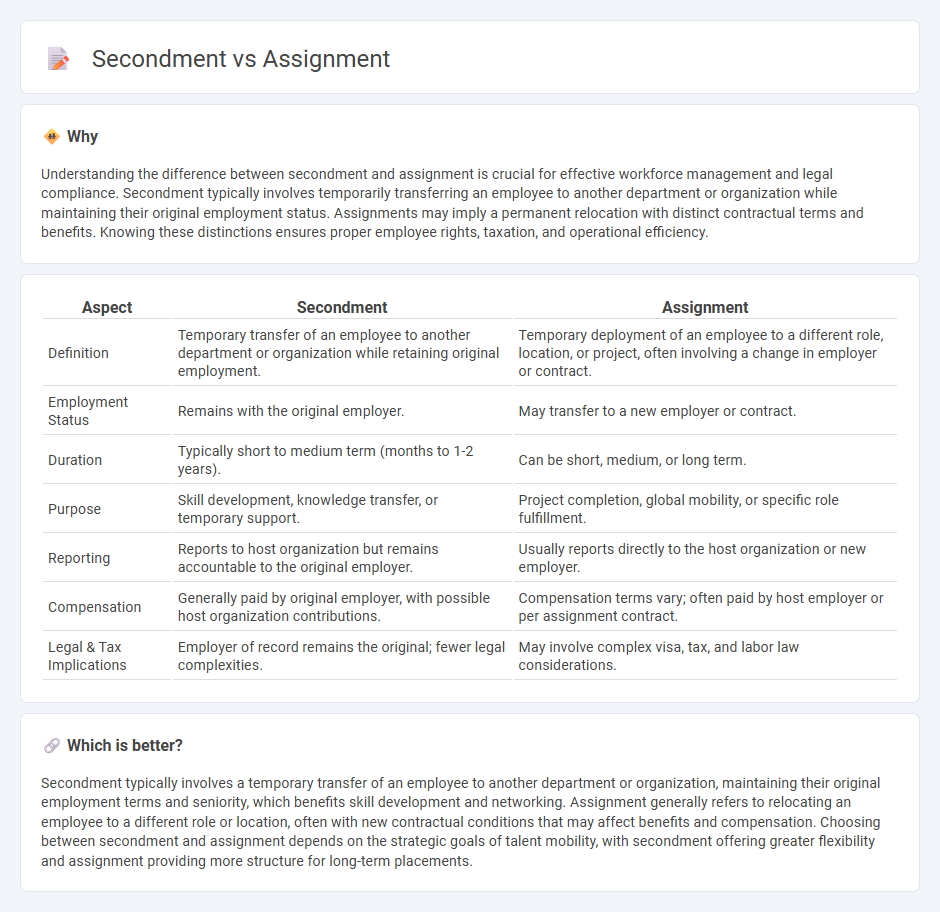
Secondment involves temporarily transferring an employee to another role within the same organization or to an affiliated company, often to develop skills or support specific projects. Assignment typically refers to a fixed-term job placement, which may be domestic or international, focusing on achieving defined business objectives. Explore the distinctions between secondment and assignment to optimize workforce mobility strategies.
Why it is important
Understanding the difference between secondment and assignment is crucial for effective workforce management and legal compliance. Secondment typically involves temporarily transferring an employee to another department or organization while maintaining their original employment status. Assignments may imply a permanent relocation with distinct contractual terms and benefits. Knowing these distinctions ensures proper employee rights, taxation, and operational efficiency.
Comparison Table
| Aspect | Secondment | Assignment |
|---|---|---|
| Definition | Temporary transfer of an employee to another department or organization while retaining original employment. | Temporary deployment of an employee to a different role, location, or project, often involving a change in employer or contract. |
| Employment Status | Remains with the original employer. | May transfer to a new employer or contract. |
| Duration | Typically short to medium term (months to 1-2 years). | Can be short, medium, or long term. |
| Purpose | Skill development, knowledge transfer, or temporary support. | Project completion, global mobility, or specific role fulfillment. |
| Reporting | Reports to host organization but remains accountable to the original employer. | Usually reports directly to the host organization or new employer. |
| Compensation | Generally paid by original employer, with possible host organization contributions. | Compensation terms vary; often paid by host employer or per assignment contract. |
| Legal & Tax Implications | Employer of record remains the original; fewer legal complexities. | May involve complex visa, tax, and labor law considerations. |
Which is better?
Secondment typically involves a temporary transfer of an employee to another department or organization, maintaining their original employment terms and seniority, which benefits skill development and networking. Assignment generally refers to relocating an employee to a different role or location, often with new contractual conditions that may affect benefits and compensation. Choosing between secondment and assignment depends on the strategic goals of talent mobility, with secondment offering greater flexibility and assignment providing more structure for long-term placements.
Connection
Secondment and assignment both involve temporarily transferring an employee to a different role or location within or outside the organization to fulfill specific business needs. While secondment typically refers to a temporary placement often aimed at skill development or interdepartmental collaboration, an assignment usually focuses on project-based tasks or international work relocation. Both practices enhance workforce flexibility, employee experience, and organizational knowledge exchange.
Key Terms
Contractual Relationship
Assignments typically involve an employment contract where the individual remains employed by the home company while working temporarily at a different location or subsidiary, maintaining clear legal ties and responsibilities. Secondments often entail a tripartite contractual arrangement between the employee, the home employer, and the host organization, outlining specific duties and duration, while the employee usually retains their original employment terms. Explore detailed distinctions and implications of assignment and secondment contracts for effective workforce management.
Employer Control
Employer control significantly distinguishes assignments from secondments, as assignments typically involve the employer retaining direct oversight over the employee's tasks, work environment, and performance standards. In contrast, secondments often entail temporarily placing an employee within another organization or department, resulting in shared or reduced employer control during the period. Explore further to understand how these differences impact legal responsibilities and employee management.
Legal Liability
Assignment refers to the transfer of an employee's role or duties to a different position, often within the same organization, while secondment involves a temporary transfer to another department or organization with an expectation of return. Legal liability in assignments typically rests with the employer maintaining the employment contract, whereas in secondments, liability can shift depending on agreements between the sending and receiving entities. Discover more about managing legal responsibilities in employee transfers and secondments here.
Source and External Links
assignment | Wex | US Law | LII / Legal Information Institute - Assignment is a legal term referring to the transfer of rights, property, or benefits from one party (assignor) to another (assignee), commonly used in contract and property law.
Assignment - Definition, Meaning & Synonyms - Vocabulary.com - An assignment is a task or duty given by someone in authority, such as homework from a teacher or a mission assigned to an employee.
ASSIGNMENT | definition in the Cambridge English Dictionary - Assignment refers to the act of giving someone a particular job, piece of work, or sending them to a specific location to carry out a task.
 dowidth.com
dowidth.com